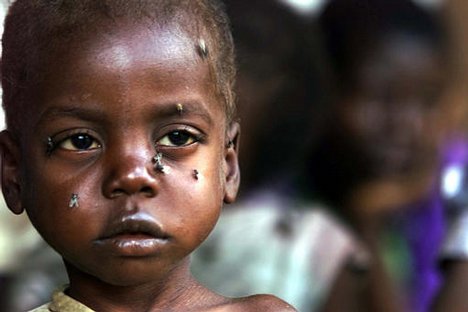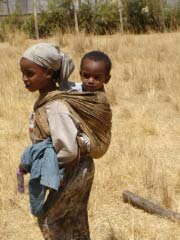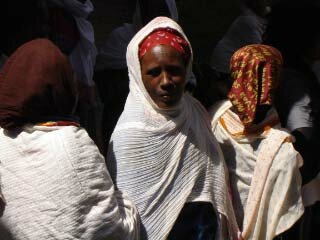- Services
- Workshops & Special Events
- Blog
- News
-
About
- Contact Us
- Mission and Guarantee
- Our Team
- Place2Give.com
Ethiopia
Flies on Eyes Poverty Marketing - Famine Relief Fundraising and Your Donation
Posted July 26th, 2011 by Gena Rotstein
in
 Another natural disaster has struck. Except in this case, it was one that was preventable and could have been planned for. I am talking about the famine in Somalia and the Horn of Africa. Do you watch TV on Saturday morning or late at night? Ever see those celebrity endorsed ads for international aid organizations with the flies buzzing around the kids with dirty faces and distended bellies? Ever wonder, how international NGO's can support kids on $30/day and still afford TV production ad time? Perhaps you also look at those kids and ask how effective is my sponsor-a-child?
Another natural disaster has struck. Except in this case, it was one that was preventable and could have been planned for. I am talking about the famine in Somalia and the Horn of Africa. Do you watch TV on Saturday morning or late at night? Ever see those celebrity endorsed ads for international aid organizations with the flies buzzing around the kids with dirty faces and distended bellies? Ever wonder, how international NGO's can support kids on $30/day and still afford TV production ad time? Perhaps you also look at those kids and ask how effective is my sponsor-a-child?
Investing in Overseas Development
Posted July 10th, 2008 by Gena Rotstein
in
- Africa
- charity
- Ethiopia
- G8
- grassroots
- international development
- Japan Summit
- NGO
- philanthropy
- Stephanie Nolen
The G8 met in Japan this past week and there was a recommitment to continue supporting foreign aid to developing countries. When I was in Ethiopia in 2006 the Economist ran an article that was flitting around the hotel I was staying in about how foreign aid is creating an African society of un-empowered, unmotivated, and sense of entitlement from foreigners to ensure that the lives of Africans improved.
At the time I thought it made sense. As someone who has traveled to many developing countries, I saw first-hand how North American aid was being used. From the fancy UN land rovers to the extravagant parties  held by dignitaries to honour each other for jobs well done in attacking polio, malaria and AIDS. Money that you, the average donor, who worked hard to earn and then to invest back in community was being squandered by many of the largest NGO's. The most shocking part of it was that I was part of the problem. I was feeding into a system that had very lax accountabilities.
held by dignitaries to honour each other for jobs well done in attacking polio, malaria and AIDS. Money that you, the average donor, who worked hard to earn and then to invest back in community was being squandered by many of the largest NGO's. The most shocking part of it was that I was part of the problem. I was feeding into a system that had very lax accountabilities.
Fast-forward to 2008 for my second trip to Ethiopia (third trip to Africa). It is amazing the difference in how, not only I view foreign investment, but how organizations are using those funds. While there was definitely evidence of the African expectation that as a Canadian, I will automatically give money or sponsor immigration (from the airport employee in the Nairobi, Kenya airport terminal who guided me through a maze of mis-connections and then asked me to help get him to Canada or at least pay for the service that was his job, to the student whom I met in Addis who has repeatedly emailed me asking for ways to move to Canada or the least I could do would be to pay for his education), the grassroots movement is growing quickly.
The rapid growth of grassroots development in Ethiopia, Tanzania, Kenya and South Africa is cause for celebration (these are the countries that I have traveled to - if you check out ChristmasFuture you will find other grassroots initiatives from other parts of the world). The need for foreign  investment is ever present, however, instead of the North Americans coming in and saying this is how you should fix your problem, it is the villages and the communities that are saying this is what we need to fix our problems, will you help us achieve our goals and objectives.
investment is ever present, however, instead of the North Americans coming in and saying this is how you should fix your problem, it is the villages and the communities that are saying this is what we need to fix our problems, will you help us achieve our goals and objectives.
The disconnect that I see is not between NGO's and implementing organizations (though there are some other major issues facing funding organizations and implementing partnerships). Rather, I see this disconnect being between what the G8 governments are funding and how they are making those investments. From Bush's ABC protocol on AIDS funding (which has since been modified slightly), to the UN's project management to CIDA's crazy maze of application funding and accountabilities it is no wonder that our tax dollars that are being invested in foreign aid do not seem to be having an impact.
I recently hosted a lunch with Dr. Richard Northcott, founder of Canadian Humanitarian and few people who have invested significantly in overseas projects. One of the things that I gained from this meeting was how poorly our government bodies and large-scale NGO's take into consideration the cultural mores of the country in which they are investing. Let's take AIDS eradication - there are some tribes in Africa where multiple partners is a sign of wealth and power. In one tribe in Ethiopia, for example, when a man gets married it is expected that his previous lovers will bring gifts for the new couple. So it benefits him and his wife for him to have had several partners before marriage to increase his material wealth upon marriage. How then can one expect abstenance to be part of AIDS education when that will directly impact the wealth of the family down the line? It is all well and good that our governments are investing in foreign aid. The thing is that it has to be invested wisely and as Stephanie Nolen has pointed out on several occaisions, because the governments in developed countries are not investing wisely they are creating cycles of entitlement and rather than solving the various problems afflicting developing countries.
Of course this does not stop at government bodies and carries through to the NGO's that are doing projects with implementing partners in the developing world... But that is for another blog post.
- Gena Rotstein's blog
- Add new comment



